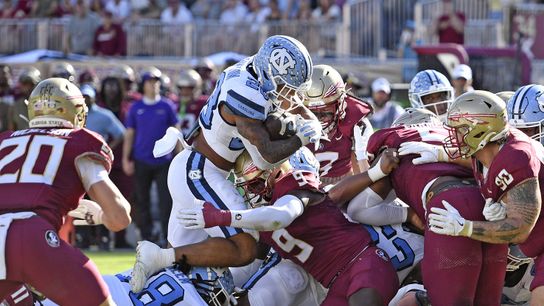ESPN has agreed to pick up its option to continue broadcasting ACC sports through 2036 in a move that will secure the near-term future of the conference, according to multiple reports on Thursday.
Had ESPN not extended its option, the network's contract with the conference would have expired after the 2027 season, creating instability within the 17-member league.
Instead, ESPN and the ACC will continue forward with multiple new strategies that should benefit the conference and its television partner.
First, the conference has agreed to deliver more "value adds" in its scheduling. In short, this likely means more Notre Dame-Clemson football games, and less Notre Dame-Wake Forest (no offense to Wake Forest). Yahoo reported the Fighting Irish are expected to play two of Florida State, Miami or Clemson each season.
Second, the ACC will hold aside a percentage of its ESPN paychecks in what will be called a "brand fund." This will be reserved for the schools that generate the most revenue in the major TV sports. While the formula has not been finalized, this is basically a way for the ACC to pay Florida State, Clemson and North Carolina beyond what their conference counterparts make. In 2023, the ACC launched a "success initiative" to heap extra money to schools who succeed on the field.
As ESPN writes:
Between the brand and success initiatives, it is expected that the ACC schools that maximize both revenue streams could close the gap with Big Ten and SEC schools to as little as a few million annually.
In exchange, Florida State and Clemson are expected to drop their lawsuits against the conference. Florida State in particular has been aggressive in claiming the ACC failed in its duty to maximize the Seminoles' television revenue, and that ACC membership has damaged the school's brand as it attempts to compete with the SEC and Big Ten. Florida State has claimed it delivers 15 percent of the television value to the ACC, yet receives only 7 percent of the revenue.
It would have cost Florida State upwards of half a billion dollars to extract itself from the ACC, and whether the school would have been allowed to make money in the SEC or Big Ten (if either of those leagues even invited them after suing their way out of the ACC, which remained to be seen) was a complete unknown. A grant-of-rights contract has never been challenged in court.
In exchange for dropping their lawsuits, Clemson and Florida State have asked the ACC to reduce the penalty for breaking the GoR after 2031, which is when the SEC, Big Ten and Big 12's TV contracts expire, according to ESPN.
Why would the Wake Forests and Boston Colleges agree to such an arrangement that funnels more money to the Seminoles, Tigers and Tar Heels and away from themselves? It's simple: they've seen what happens when a conference collapses. From ESPN:
Multiple administrators who spoke with ESPN noted the severe impact that the collapse of the Pac-12 had on Oregon State and Washington State, and the observably diminished values of those programs has helped spark interest in negotiating a settlement.
As always, stay tuned to The Scoop for the latest.
